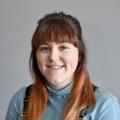
Ten people from across the Diocese of Carlisle have been chosen for ordination training.
The number represents a recent high for the Diocese, with candidates due to begin their training this year.
The group includes two retired GPs, a senior practice nurse, a vet, a senior partner in an international firm of actuaries and a HR executive.
Four will train towards stipendiary ministry while six will train towards self-supporting ministry, which is unpaid.
Seven will train part time for three years with Cumbria Christian Learning, which is part of the Diocese's God for All tea, while thee others complete full time studies.
The Reverend Canon Peter Clement, Diocesan Director of Ordinands, said: "It is some years since we have seen this number of successful candidates so we are delighted. As we move forward into the future we must look at new ways of leadership in our churches. Lay ministry and self supporting ordained ministry will become increasingly important.
"Our vision for the last few years has set us in good stead for the future, but we need to keep listening to God to see who else might be called into new and exciting forms of active discipleship and calling in our churches. I am very excited about the possibilities fTen people from across the Diocese of Carlisle have been chosen for ordination training.
The number represents a recent high for the Diocese, with candidates due to begin their training this year.
The group includes two retired GPs, a senior practice nurse, a vet, a senior partner in an international firm of actuaries and a HR executive.
Four will train towards stipendiary ministry while six will train towards self-supporting ministry.
Seven will train part-time for three years with Cumbria Christian Learning, which is part of the Diocese’s God for All tea, while the others complete full-time studies.
The Reverend Canon Peter Clement, Diocesan Director of Ordinands, said: “It is some years since we have seen this number of successful candidates so we are delighted. As we move forward into the future we must look at new ways of leadership in our churches. Lay ministry and self supporting ordained ministry will become increasingly important.
“Our vision for the last few years has set us in good stead for the future, but we need to keep listening to God to see who else might be called into new and exciting forms of active discipleship and calling in our churches. I am very excited about the possibilities for the future.”
The route to ordination training has seen each candidate draw alongside diocesan vocations advisers and the director of ordinands as part of a discernment process which can last 18 months or longer. Each then goes before a local discernment panel before being interviewed by a national selection panel.



Comments: Our rules
We want our comments to be a lively and valuable part of our community - a place where readers can debate and engage with the most important local issues. The ability to comment on our stories is a privilege, not a right, however, and that privilege may be withdrawn if it is abused or misused.
Please report any comments that break our rules.
Read the rules hereLast Updated:
Report this comment Cancel